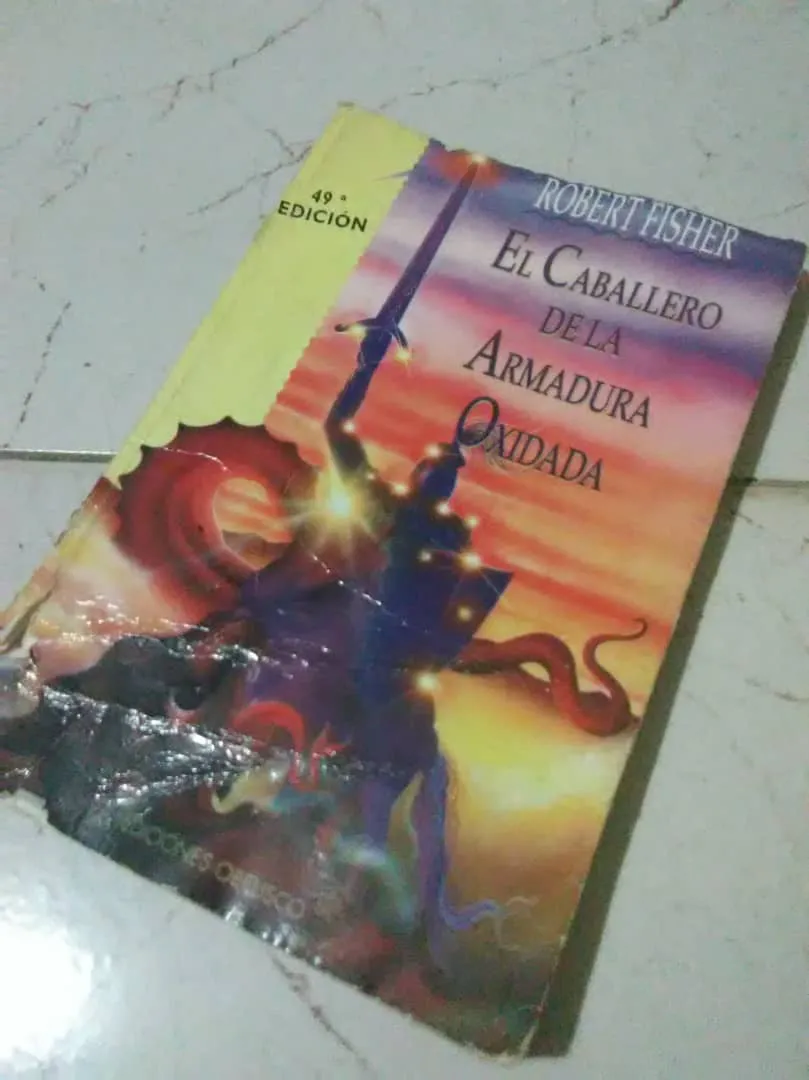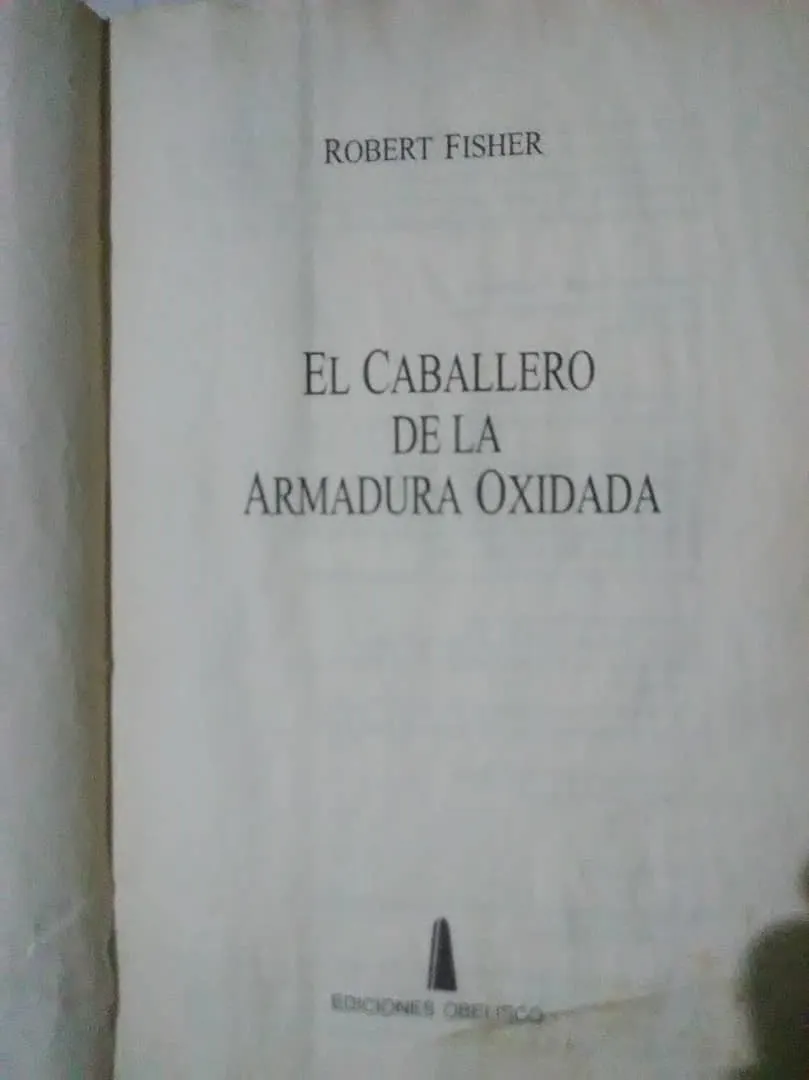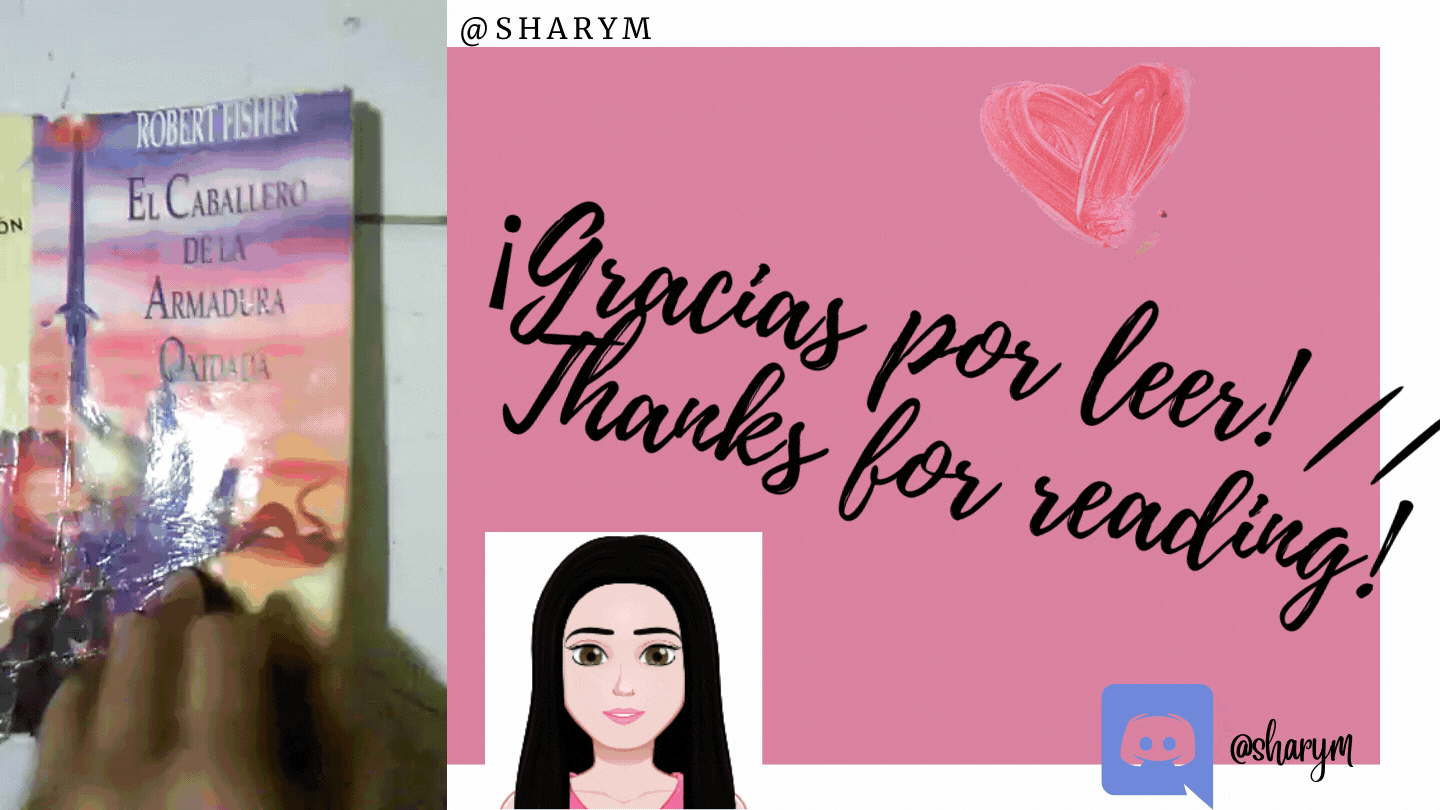¡Hola a todos! Estoy participando en el Hive Book Club Community Contest #3, si quieren saber más acerca de él, se los dejo aquí. El tema que escogí fue:
What self-book that you didn't expect you would enjoy reading it? // ¿Qué libro de auto-ayuda no esperabas disfrutar leer?

Sin dudas este tema fue el ideal para mí porque hace un tiempo leí el libro “El Caballero de la Armadura Oxidada” de Robert Fisher, pero les explico un poco la situación: no me gustan los libros de Caballeros ni de la Edad Media. Pero, ¿qué tiene que ver eso con este libro de auto-ayuda? Pues, que yo jamás creí que este fuese el tema del libro, en realidad y muy lastimosamente, juzgué el libro por su portada sin detenerme a leer si quiera el índice, grave error mío. Este libro estuvo viajando por diferentes manos en mi casa, pero nadie me había dicho nada acerca de él, claro que yo sabía de su existencia, pero tampoco tenía muchas ganas de leerlo sin un empujoncito; entonces, ese empujoncito llegó y se llamó “Cuarentena sin internet”. Evidentemente, mientras más transcurrían los días, no encontraba qué hacer y terminaba revisando la casa de arriba a abajo, así fue como encontré este libro y me rendí ante él, debía leerlo y darle una oportunidad, no me iba a morir por leer unas cuantas hojas, así que eso hice. Siento que fue una iluminación divina que decidiera tomar por fin el libro y poder ver de qué se trataba realmente porque…
- No se trataba de Caballeros.
- El ambiente sí era en la Edad Media, pero…
- Se centra en usar metáforas muy evidentes, a mí parecer, para cumplir su objetivo: ser un libro de auto-ayuda.

Si no lo han leído, quizás algunos piensen igual que yo en ese entonces, pero el libro se aleja totalmente del mundo de los Caballeros, en realidad creo que usan referencias respecto a ese tiempo porque el libro está ambientado en él, pero no entran en detalles acerca de eso sino que brevemente utilizan palabras de esa época como cruzadas, dragones, princesas, castillos; es decir, no vas a leer toda la batalla entre reinos o a alguien rescatando a una princesa a lo largo del libro, sólo la simple mención de los hechos.
Este libro tiene un narrador omnisciente, permitiendo poder observar la perspectiva desde cada personaje que aparece en el libro y trata acerca de un Caballero tan enamorado de su “armadura” que olvida todo lo que está a su alrededor e ignora lo que los demás sienten. Creo que se utilizan metáforas muy claras en todo el libro que, en lo personal, me dejaron impresionada porque no esperaba leer acerca de eso.

Hay frases utilizadas a lo largo de la historia que te dejan pensando, por ejemplo “quizá siempre os habéis tomado la verdad como un insulto” y, sinceramente, ¿Cuántas veces no nos hemos enojado por algún comentario que nos han hecho pero que resulta ser la verdad? Y ¿Cuántas veces hemos pensado en ello y en cómo solucionarlo? Quizás algunos se sientan identificados con algunas frases o versos que aquí se pueden hallar. Pero, a mí el libro me dejó la primera enseñanza muy en claro y fue la que arriba mencioné: no juzgar un libro por su portada. Sí, esa frase muchos la hemos escuchando cientos de veces y casi nos la sabemos de memoria, pero, después de esto y en mi caso, ¿realmente la había tenido presente en mi vida? Sin dudas puedo afirmar que el libro me sorprendió de una forma muy buena y creo que es una gran idea leerlo cada vez que necesitemos ayuda para salir de un problema que nos consume y no afectar a nuestro alrededor inconscientemente, o para recordarnos que todos los problemas tienen solución y que, de alguna u otra forma, se pueden afrontar con valentía.
También, creo que nos recuerda la importancia de afrontar las situaciones a tiempo, antes de que se nos escapen de las manos y perdamos a personas que son realmente importantes en nuestra vida.
Espero les haya gustado y que, si alguien no lo ha leído, se anime a darle una oportunidad, realmente no es un libro nada largo y cumple directamente con su función, ¡nos leemos pronto!

English version
Hello everyone! I'm participating in the Hive Book Club Community Contest #3, if you want to know more about it, I'll leave you here. The theme I chose was:
What self-book that you didn't expect you would enjoy reading it?

No doubt this topic was the ideal one for me because some time ago I read the book "The Knight in Rusty Armor" by Robert Fisher, but I'll explain the situation a little: I don't like books about knights or the Middle Ages. But what does that have to do with this self-help book? Well, I never thought that this was the subject of the book, in fact and unfortunately, I judged the book by its cover without even stopping to read the table of contents, a big mistake of mine. This book was traveling through different hands in my house, but nobody had told me anything about it, of course I knew about its existence, but I didn't feel like reading it without a little push; then, that little push came and it was called "Quarantine without internet". Evidently, the more the days went by, I couldn't find what to do and I ended up going through the house from top to bottom, that's how I found this book and I surrendered to it, I had to read it and give it a chance, I wasn't going to die for reading a few pages, so that's what I did. I feel like it was a divine enlightenment that I decided to finally pick up the book and be able to see what it was really about because...
- It was not about Knights.
- The setting was in the Middle Ages, but...
- It focuses on using very obvious metaphors, in my opinion, to fulfill its goal: to be a self-help book.

If you haven't read it, maybe some of you think the same as I did back then, but the book is totally removed from the world of the Knights, actually I think they use references regarding that time because the book is set in it, but they don't go into detail about that but briefly use words from that time like crusades, dragons, princesses, castles; I mean, you're not going to read the whole battle between kingdoms or someone rescuing a princess throughout the book, just the simple mention of the events.
This book has an omniscient narrator, allowing you to observe the perspective from every character that appears in the book and is about a Knight so in love with his "armor" that he forgets everything around him and ignores what others feel. I think very clear metaphors are used throughout the book which, personally, left me impressed because I didn't expect to read about that.

There are phrases used throughout history that leave you wondering, for example "maybe you've always taken the truth as an insult" and honestly, how many times have we not been angered by some comment that has been made to us but turns out to be the truth? And how many times have we thought about it and how to fix it? Maybe some of you can identify with some of the phrases or verses that can be found here. But, for me, the book made the first lesson very clear and it was the one I mentioned above: don't judge a book by its cover. Yes, many of us have heard that phrase hundreds of times and almost know it by heart, but, after this and in my case, had I really kept it in mind in my life? Without a doubt I can say that the book surprised me in a very good way and I think it is a great idea to read it every time we need help to get out of a problem that consumes us and does not affect our surroundings unconsciously, or to remind us that all problems have a solution and that, in some way or another, can be faced with courage.
Also, I think it reminds us of the importance of facing situations in time, before they get out of hand and we lose people who are really important in our lives.
I hope you liked it and that, if someone has not read it, you are encouraged to give it a try, it really is not a long book at all and it fulfills its function directly, see you soon!








